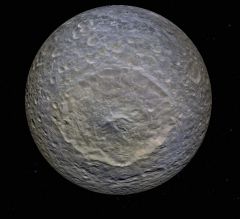Mimas
| Mimas | |
|---|---|

| |
| Mimas in Orbiter 2016 with D3D9 client | |
| Designation | |
| Name | Mimas |
| Reference body | Saturn |
| Planetary mean orbits | |
| Epoch | 2005.41409993155 |
| Semimajor axis (a) | 186037830.154953 m |
| Eccentricity (e) | 0.0215133482144328 |
| Inclination (i) | 29.18891093° (0.509442600779845 radian) |
| Longitude of the ascending node (LAN, ☊) | 167.3070822° (2.92005944692024 radian) |
| Longitude of periapsis (ϖ) | 449.3704298° (7.84299356271481 radian) |
| Mean longitude (L) | 772.976419° (13.4909835524773 radian) |
| Selected physical parameters | |
| Mean radius | 196000 km |
| Mass | 3.80×1019 kg |
| Rotation elements | |
| SidRotPeriod | 74239 seconds (20.622 hours) |
| SidRotOffset | 0 |
| Obliqutiy | 0.4895 |
| LAN | 6.09808 |
| Note | *Elements given are from Mimas.cfg (Orbiter 2005P1) |
Mimas [MY-mass] is one of the innermost moons of Saturn. William Herschel discovered the moon on 17 September 1789. The surface is icy and heavily cratered. Mimas has a low density, meaning it probably consists mostly of ice. Because Mimas has such a low temperature of about -200° C (-328°F), the impact features may date back to the time of the moon's creation.
One of the craters, named Herschel, is surprisingly large in comparison to the size of the moon. The crater is 130 kilometers (80 miles) wide, one-third the diameter of Mimas. Herschel is 10 kilometers (6 miles) deep, with a central mountain almost as high as Mount Everest on Earth. This central peak rises 6 kilometers (4 miles) above the crater floor. This impact probably came close to disintegrating the moon. Traces of fracture marks can be seen on the opposite side of Mimas.
Although Mimas is heavily cratered, the cratering is not uniform. Most of the surface is covered with craters greater than 40 kilometers (25 miles) in diameter but in the south polar region, craters greater than 20 kilometers (12 miles) are generally lacking. This suggests that some process removed the larger craters from these areas.
Mimas was named by Herschel for Mimas, the Titan who was slain by Hercules.
Mimas in Orbiter[edit]
Mimas was first introduced to Orbiter with the release of Orbiter 2002.
| Add-on | Source | Version | Author | Type | Release Date | Compatibility | Wiki article |
|---|---|---|---|---|---|---|---|
| Orbiter 2016 - torrent files | O-F Resources | 2016 | martins | Orbiter Download | 23 August 2016 | Orbiter 2016 | |
| Orbiter 2016 Core - MSI / EXE edition | O-F Resources | 2016 | martins | Orbiter Download | 23 August 2016 | Orbiter 2016 | |
| Orbiter 2016 Core - ZIP edition | O-F Resources | 2016 | martins | Orbiter download | 23 August 2016 | Orbiter 2016 | |
| Orbiter core package download (The actual download page for Orbiter 2016) |
Orbiter download page | Orbiter 2016 | martins | Orbiter download | 23 August 2016 | Orbiter 2016 | |
| Celestial Bodies Motion - Part 1/4 - v2.0.0 | O-F Resources | v2.0.0 | cristiapi | Scenery | 2 July 2015 | *module only | |
| Orbiter 2010-P1 | O-F Resources | 100830 | martins | Orbiter Download | 30 August 2010 | Orbiter 2010-P1 | |
| Orbiter 2010 | O-F Resources | 100606 | martins | Orbiter Download | 5 June 2010 | Orbiter 2010 | |
| Orbiter 2006-P1 | O-F Resources | 060929 | martins | Orbiter Download | 29 September 2006 | Orbiter 2006-P1 | |
| Orbiter 2006 | O-F Resources | 060504 | martins | Orbiter Download | 4 May 2006 | Orbiter 2006 | |
| The Outer Planets 050329 Update | AVSIM | 050329 | Rolf Keibel Tony Dunn Carl Romanik |
Scenery | 30 March 2005 | ||
| The Outer Planets 050223 Update | O-F Resources | 2005-02-23 | VF2_Rolf | Scenery | 23 February 2005 | ||
| The Outer Planets 050125 | AVSIM | 050125 | Rolf Keibel Tony Dunn |
Scenery | 26 January 2005 | Orbiter 2005-P1 | |
| 2005 (with P1 patch files) | O-F Resources | 050216 | martins | Orbiter Download | 16 February 2005 | Orbiter 2005 | |
| Mimas 1.0 | O-F Resources | 1.0 | BigJimW | Scenery | 24 January 2005 | ||
| Orbiter 2003-P2 | O-F Resources | 031217 | martins | Orbiter Download | 17 December 2003 | Orbiter 2003-P2 | |
| Orbiter 2003-P1 | O-F Resources | 031105 | martins | Orbiter Download | 5 November 2003 | ||
| Moons of Saturn Part 3 | AVSIM | Rolf Keibel | Scenery | 19 October 2002 | |||
| Orbiter 2002 | O-F Resources | 020419 | martins | Orbiter Download | 19 April 2002 | Orbiter 2002 | |
See also[edit]
Gallery[edit]
Mimas as seen by the w:Cassini-Huygens spacecraft on 13 February 2010
from Wikimedia Commons
| edit The Solar System | |
|---|---|
| Central star |
Sun (Sol) |
| Planets |
Mercury - Venus - Earth - Mars - Jupiter - Saturn - Uranus - Neptune |
| Natural satellites |
Moon - Phobos - Deimos - Io - Europa - Ganymede - Titan - more... |
| Add-ons |
Planets - Dwarf Planets - Small objects - Natural satellites - Alternative star systems |
 | This natural satellite related article is a stub. You can help Orbiterwiki by expanding it.
|









